Feature
How Independent Bookstores Are Reinventing Themselves
At the best of times, independent bookstores have a lot to contend with, given the constant competition with online retail giants who offer huge discounts, promise quick deliveries and take on risks that small spaces simply cannot afford. Yet, propelled by a love for books and the dream of bringing booklovers together, independent bookstores create a tribe of readers who value the personal touch of an informed and thoughtful bookseller.
In the challenging times following the outbreak of COVID-19, it was this loyal tribe that independent bookstores turned to for help, first, by appealing to them to buy gift vouchers, and later, by encouraging them to shop local. Buying vouchers when stores were compelled to stay shut was an act of faith, and bookstores were overwhelmed by the support they received – support that they greatly needed because loan EMIs, rent and salaries still needed to be paid.
Yet, vouchers would be redeemed eventually, and those costs would still need to be met. With the idea of isolation and social distancing looming over us for the foreseeable future, bookstores needed to do much more to stay alive.
Moving Online
Several independent bookstores were not equipped to switch from an offline world to an online one. Pune’s Pagdandi, for instance, was set up to bring strangers together and foster meaningful interactions in a friendly space away from screens. However, this was turned upside down with the lockdown. Online stores seemed the most viable way to stay alive, and Pagdandi burnt the midnight oil uploading their catalogue onto their website. They also realised that they had a slight advantage during the time that e-commerce sites were not allowed to deliver non-essential goods, and they used it to the fullest. Pagdandi soon realised that customers were willing to pay Dunzo fees that equalled or sometimes even exceeded the cost of the books they were buying.
However, the question persisted: why would loyal customers continue to choose independent bookstores, particularly online, when Amazon promised bigger discounts and faster delivery?
Booksellers had to find ways to remind customers of the value of independent stores and the cultural space they create. By moving familiar events online and by coming up with new and innovative kinds of virtual interaction, they extended their warmth through the Internet, instead of in their physical store. Thus, the iconic Kitab Khana’s Translation Tuesday, Pagdandi’s monthly Urdu poetry sessions, Goa-based Literati’s book club discussions and Kolkata-based Storyteller’s author visits all moved online, continuing to nurture a community of readers in a socially distant world.
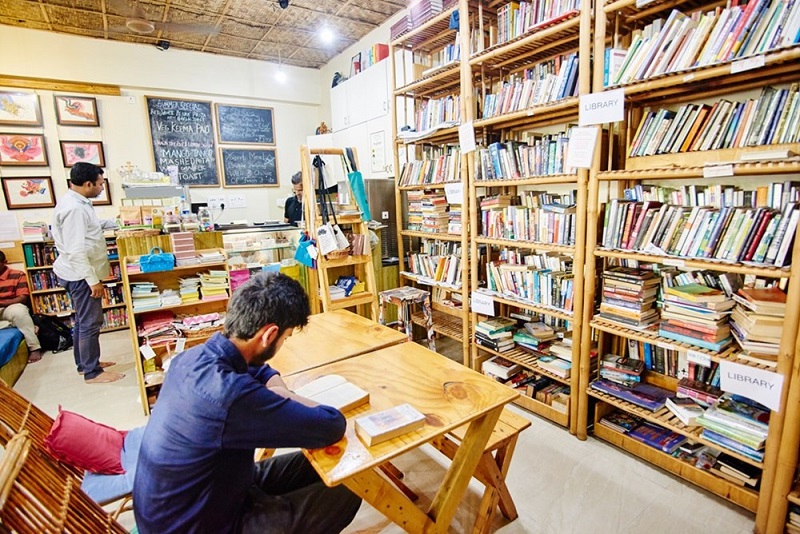
(Pagdandi Book Cafe, Pune; Image via Citadel Pune)
Out-Of-The-Box Customer Engagement
But engagement is not the only factor that keeps a store going. With the reduced footfall, income needed to be generated through other avenues. Bengaluru’s Champaca started with free online events to test the waters and then went on to paid events, like quizzes and workshops. They were quick to take advantage of a surge of interest in online events, even inviting author Roxane Gay to talk to participants about her writing process, an event that would have been so expensive as to being next to impossible in the physical store.
Mumbai-based Kahani Tree chose a different path, steering clear of hosting events of its own. With so much excellent content online, they were wary of organising sessions that would disappear into the ocean of live events on social media. Instead, they chose to focus on customer engagement via personal recommendations on the phone.
Part of the bookstore experience involves flipping through books, browsing the store and asking for suggestions. It is this experience that Kahani Tree seeks to replicate on the phone, even retrieving old orders for returning customers so as to make relevant and valuable suggestions, thus reminding customers that a good independent bookstore is not just another disinterested, faceless retailer.
The personal touch helped Bengaluru’s Funky Rainbow discover something exciting during the lockdown. While they already had an online store, they would manually update their inventory, something that often took a backseat in pre-COVID times. With the lockdown, online orders spiked, but their inventory was outdated, and many customers ended up ordering books that were not in stock. Funky Rainbow called customers to apologise and suggest alternatives. They soon realised that their thoughtful recommendations led to more sales than the impersonal online model, highlighting the fact that personalised recommendations were far more valuable than automated ones based on browsing history.
This birthed Funky Rainbow’s ‘Buzzaars’ – live events on social media. Customers post their comments and questions during the chat, hosted at the bookshop itself. The experience of browsing in a bookstore is recreated, redefining the idea of online shopping.
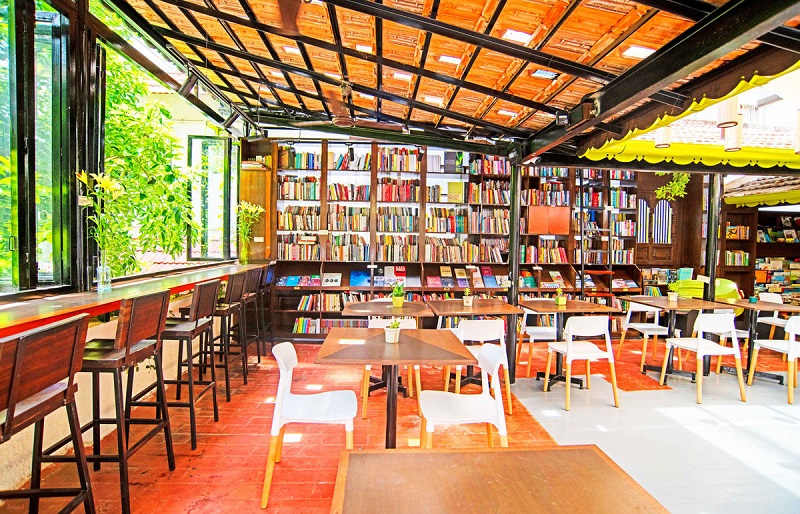
(Champaca, Bengaluru; Image via Dineout)
Constantly Innovating
At the same time, it soon became crucial for bookstores to create fresh, exciting content to garner attention again. Otherwise, they ran the risk of stepping out of the consciousness of booklovers who could easily drift towards online retail giants.
This made Funky Rainbow launch their ‘Locked Down But Not Out’ quiz, where each question dealt with a literary figure who was physically or figuratively locked down. It featured characters like Captain Nemo from Twenty Thousand Leagues Under The Sea, and Harry Potter, trapped in tricky situations while hunting Horcruxes. Anticipating a new question at noon each day, the online community was drawn to an independent bookstore yet again.
The lockdown was also the perfect moment for Champaca to launch its book subscription initiative. Through this model, carefully curated books, selected to be accessible and interesting to a range of readers, are delivered to subscribers each month, thus combining personal bookselling with social distancing.
Kahani Tree, too, used the lockdown to bring an old plan into action, a newsletter called Kahani Khabar. With a roundup of new children’s books being delivered to inboxes each month, Kahani Tree subtly reminds customers of their friendly neighbourhood store.
While several independent booksellers had discussed setting up the Independent Bookshops Association of India (IBAI) earlier in the year, the pandemic created a pressing need to pool in their knowledge and support each other to ensure survival. Six bookstores decided that it was now or never and they got together to form the IBAI. With their stores shut, they had the time to reflect on the challenges and needs of independent stores. They have already started helping each other out by fulfilling orders for one another. More members have now signed up, seeking to promote the role of independent bookstores in the publishing industry and combine their strengths by sharing best practices and resources.
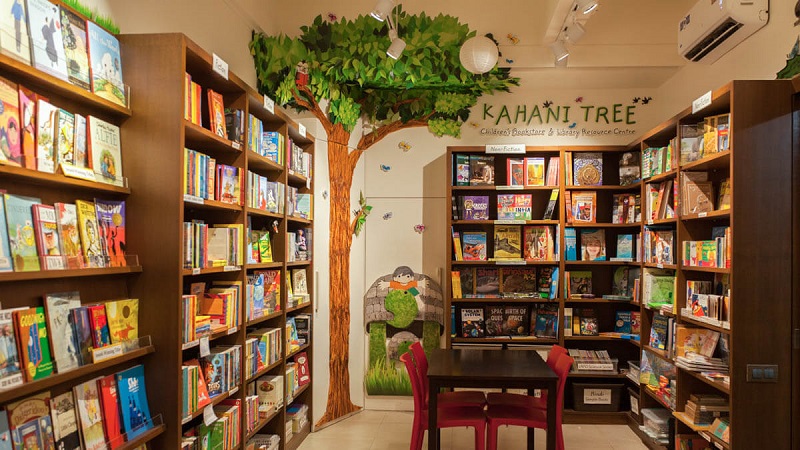
(Kahani Tree, Mumbai; Image via The City Story)
The Future Of Independent Bookstores
The face of physical bookselling has changed because of the need to stay safe, but optimism is in the air. Many believe that this may well be the year of independent bookstores simply because of the energy and innovation that is now going into keeping them alive.
Families have started visiting Storyteller in Kolkata because they see it as a sanitised space, away from the crowds that may flock to large chains. For those who prefer to stay home, stores are only too willing to send pictures, hold video chats and deliver books. Customers do walk into stores like Literati, but deliveries and pick-ups are far more popular. Literati actively encourages customers to buy books over email and WhatsApp, and though they have always delivered nationwide, the number of deliveries has increased in recent times.
Adapting to a new world, bookstores are constantly coming up with innovative ideas and reminding customers of the value of brick-and-mortar stores, which could easily get swallowed up without the support of the reading community. Through exciting events and personal engagement, readers realise time and again that even though the joy of visiting a bookstore and soaking in the ambience has to take a backseat, the experience of book-buying at a friendly neighbourhood store remains as warm and welcoming as ever.

Varsha Seshan is a writer of lists, emails, detailed notes to self and children’s books. She has written 15 books for children and has twice been shortlisted for the Scholastic Asian Book Award. When she is not writing, she is usually travelling, working with children or dancing. She conducts reading and writing workshops for children and adults at schools and libraries. She also facilitates a writers’ club for pre-teens at a school in Pune (India), where she lives. A classical dancer with over 25 years of training in Bharatanatyam, she has performed extensively in India and abroad. Find out more at www.varshaseshan.com
Read her articles here.

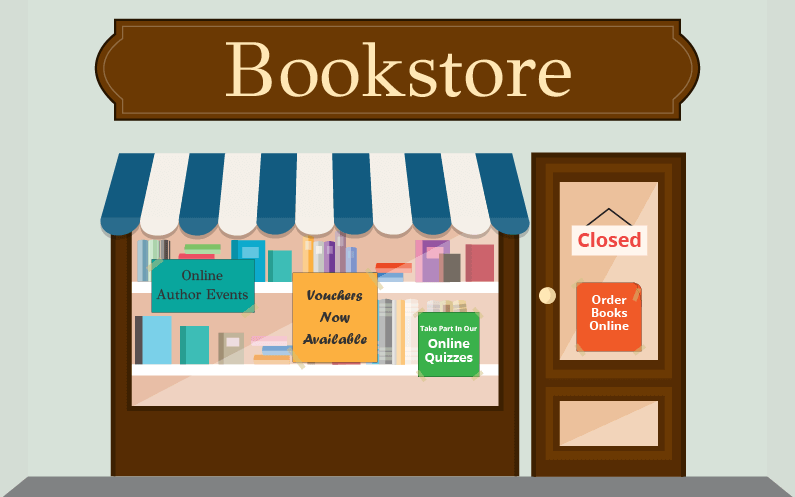
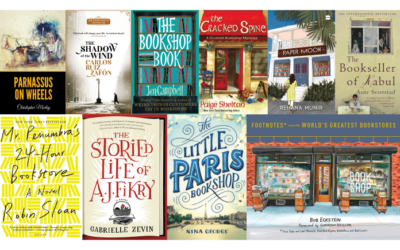


Well-researched article, Varsha. I wasn’t aware that so many beautifully curated book-spaces existed in India.
Some years ago, I read an article that argued: In the age of globalisation, the only thing that enables a small and local business to survive is the personal touch. In that context, this applied to industries like grooming and dining out — we can’t get our nails done over SKype. But it’s also true of any kind of business where humans, rather than computer algorithms, mediate between the client and the product. That’s tha appeal of any kind of boutique experience, isn’t it — that something’s being recommended specifically to you, by another human who knows your taste. And the ability to connect to other people who enjoy the same experience is also something, as you observe, that retail giants can’t yet replicate.
May I ask whether you conducted interviews to write this article? Did you do them over the course of your other work before the lockdown? Or did you do the research specifically for this article?
Thank you so much! There are many more beautifully curated spaces; I was able to talk to just a handful.
I was already connected to a few of them before the lockdown. I’ve visited some, and I follow several on social media. I saw the work they were doing, which is what made me think of writing this article. Before I wrote, however, I reached out to them for details of what they were doing to stay alive at this time.